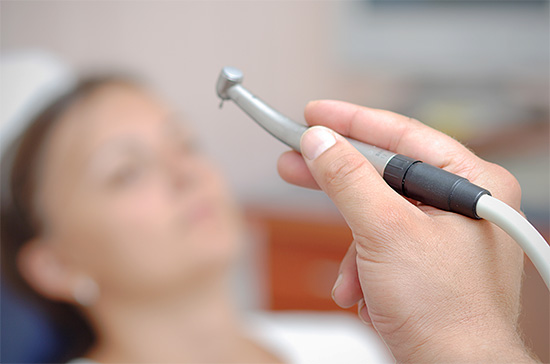
Treatment of caries has long been a service that is fully subordinate to market relations. This means that patients prefer to visit those dental offices in which the teeth are treated, firstly, qualitatively, and secondly - painlessly. In some places, there are rooms with old equipment and doctors of the old school, who believe that it is better for the patient to suffer several “lumbos” than to pay for an anesthetic injection.
In most clinics today treat caries it does not hurt at all, and this procedure is only sometimes associated with minor unpleasant situations that can be quickly remedied. For example, if the first anesthesia did not work, an additional one is done. But in such cases, the pain during the work of the dentist is not exactly stronger than at home when eating with a bad tooth.
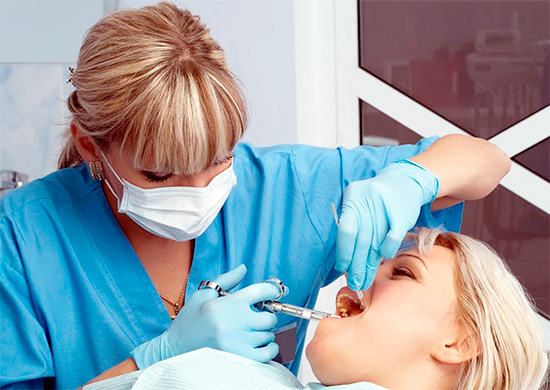
Feedback
“I was probably lucky, and before the age of twenty, I never had a dentist at all.I remember a couple of times in my childhood my baby teeth were torn, but I never had to treat anything. Already when I went to work after the institute, the first time my tooth ached during the meal. Somehow I didn’t particularly think if it would hurt caries, I only understood that I would have to treat anyway, but the sooner it is done, the better. Therefore, she came to the doctor as soon as the pain became regular. Indeed, it turned out caries. I got a good doctor, she said right away that it would be necessary to drill, but there’s nothing really terrible about it, and therefore it won’t hurt and it’s better not to do anesthesia. Indeed, she literally worked there for a couple of minutes with a typewriter, and I only had one prick. Nothing more was unpleasant. But in general, the cabinet itself was good, the equipment was so new, clean, and from the drill itself at work the water was constantly being sprayed, which, in my opinion, reduces pain. Since that time, three years have passed, I was at the dentist one more time, only with a different tooth, and everything was just as painless too. ”
Inna, Yekaterinburg
But twenty years ago it was really painful to treat caries. Today, even the most neglected form of it is treated in such a way that the patient does not feel even half of the pain that he could feel in the Soviet era.Therefore, it is not at least logical to go with the suffering tooth and be afraid to come to the dentist to get rid of the pain already within 20-30 minutes, at least not logical, and considering the risk of developing caries complications.
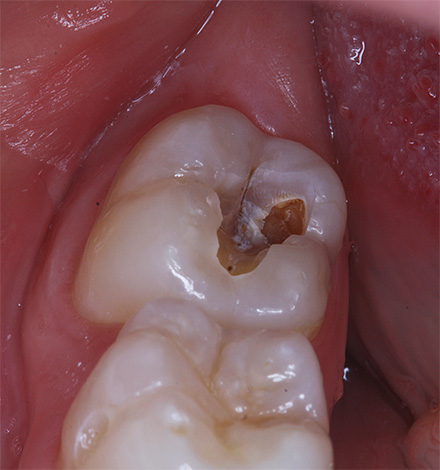
Feedback
“Treatment of caries is generally, in my opinion, the simplest and most fearless thing that can be done in the dental office. I still found times when there was no cold water sprayer on the drills, and even then, if I went to a doctor in time, it didn’t work. Well, maybe somewhere in there the doctor will touch something sick, but this happens randomly and quickly. But how great you feel when the tooth whines for a week, and here again - and there is no trouble. Recently, an old seal fell on my business trip, my tooth ached, I went to the doctor, he said that the nerve should be removed. It would seem a complicated procedure. But nothing terrible either. They made the injection, waited a couple of minutes - and that’s all, there are no feelings at all, whatever they do in the mouth. ”
Andrei Tomilin, Cheboksary
Types of caries and sensations in their treatment
Caries at different stages of its development requires different treatment, and the patient's feelings with them also differ slightly.
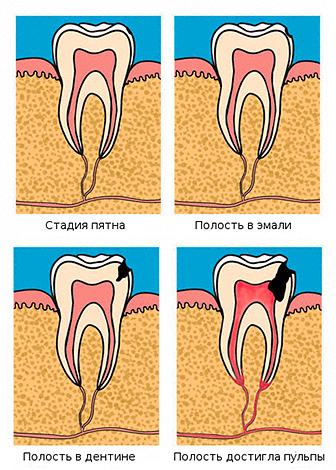
In caries at the staining stage, the enamel lesion is treated first with special grinding materials, and then enamel-repairing preparations are applied to it. These procedures are painless, and the sensations are similar to a thorough brushing of the teeth with a toothbrush.
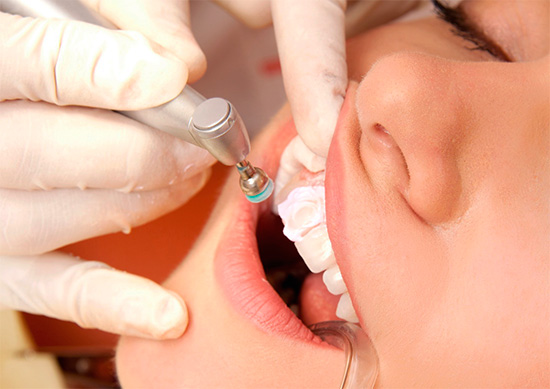
Sometimes, before treating caries at the stain stage, the doctor has to remove plaque. At the same time, there is practically no pain.
Important!
With caries in the staining stage, no anesthesia (injection) is given, which most people are unduly afraid of. However, it is always anesthesia that completely excludes the appearance of even minimal sensitivity.
For superficial caries, two treatment options are possible:
- if the lesion is located on the smooth wall of the tooth, it is simply ground and restorative therapy is carried out according to the example of caries procedures at the stain stage.
- If surface caries has developed in fissures, the doctor usually decides to open them according to the protocol and seal them. If the area of destruction did not have time to reach the dentin, this procedure will not cause any painful sensations. When there is even a hint of pain or immediately at the request of the patient, the doctor immediately anesthetizes the tooth.
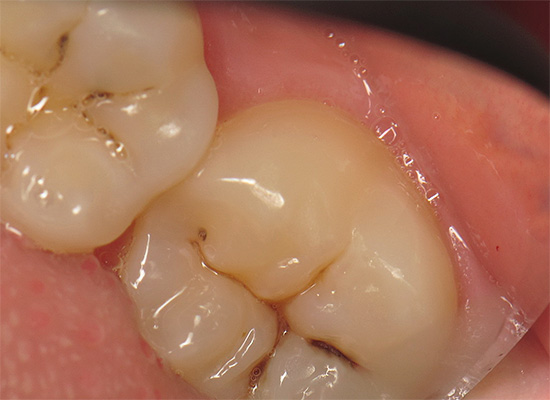
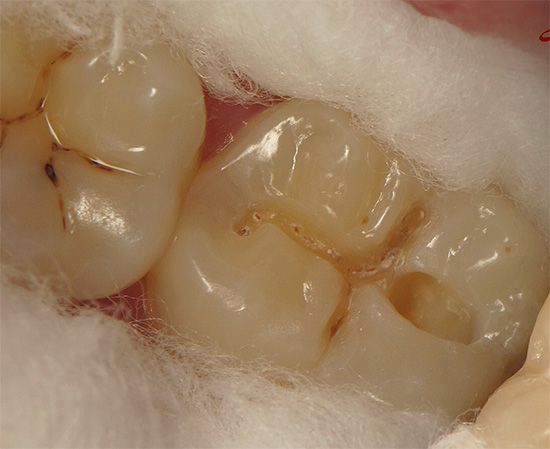
Feedback
"I had this caries on the upper front teeth. Also, dark lines appeared right under the edge of the gum. The doctor did not even do anesthesia, just cleaned them with a machine and sealed them. It was a bit unpleasant while working as a drill, but the sensations were the same as when breathing in the air with a raised lip. In general, nothing terrible.
Olga, Kiev
Tooth pain can occur when the pathological process covers the dentin area. Cleaning it with a drill can lead to irritation of nerve endings in it. Therefore, at this stage of caries development (it is called the middle one), works are more often carried out under local anesthesia. In some cases, patients can refuse anesthesia during the treatment of average caries, since the depth of the cavity is still not critical and you can suffer light painful sensations.
But deep caries treatment necessarily accompanied by anesthesia, since this destruction can reach the boundaries with the pulp chamber, where a huge number of nerve cells are concentrated. Local anesthesia allows you to make the treatment procedure from beginning to end painless and comfortable.
Anesthetics and discomfort agents
For local anesthesia in dentistry, a number of drugs are used, of which the doctor chooses the one that will provide anesthesia for the required period of time.
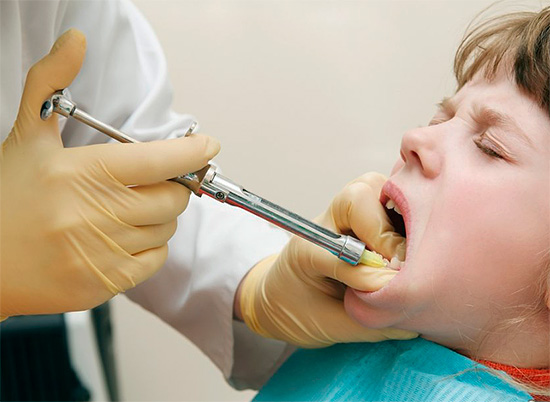
Usually in clinics the following types of painkillers are used:
- Novocain, Mepivacaine - short-acting anesthetics (about half an hour);
- Lidocaine, Artikain - anesthetics of medium duration (from one hour to one and a half hours);
- Etidocaine, Bupivacaine - long-acting drugs (more than one and a half hours).
From the practice of the dentist
Novocain in dentistry slowly but surely goes into the distant past. Most cities and cities have stopped using novocaine as anesthesia because of its inefficiency and increased risk of an allergic reaction to it. It was invented more than 100 years ago and as an anesthetic is already outdated, although its importance in modern medicine cannot be underestimated (novocaine blockades, removal of vascular spasms, dilution of preparations, etc.).
Novocain and its successor, Lidocaine, which replaced the “old” anesthetic, is diluted with a 0.1% solution of adrenaline to enhance the duration and depth of action, but, unfortunately, often by eye. Most dentists deliberately ended up from such a vicious practice, choosing imported anesthetics, already diluted with adrenaline (epinephrine). This is due to complications from an adrenaline overdose in the past. If you need to add an average of 1 drop per 5-10 ml of solution, then it is very easy to overdose on adrenaline.
Complications arise immediately in the form of fear, shortness of breath, tremor, heart rhythm disturbances, including loss of consciousness and cerebral hemorrhage. Why risk your own authority, reputation of the institution and, most importantly, the life of the patient, when there are imported anesthetics that are completely ready for use, have quality certificates, practically do not cause complications and allergic reactions, are effective for different anesthesia techniques in dentistry ...
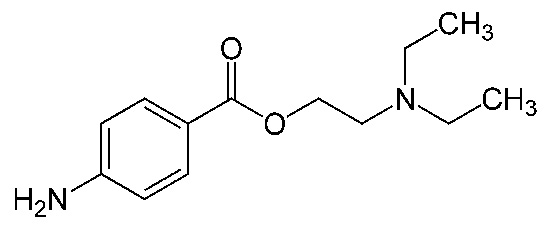
Anesthetics are administered using a syringe (usually carpool), and depending on the group of the tooth and its location, they are injected into different areas:
- into the transitional fold closer to the projection of the root of the tooth (infiltration) to turn off the peripheral "nerves" that fit the tooth (from the outer and inner side).
- In the area of the exit of the main "nerve" for the complete "disconnection" of pain impulses on several teeth (conduction anesthesia). For example, in the treatment of the lower molars, torusal or mandibular anesthesia is often performed, which allows you to treat 3-5 teeth without pain right away while it is working.
- Intraligamentary (intra-cohesive) anesthesia is done in the periodontal ligament using a specially designed syringe for this technique. When this is achieved, the high efficiency of anesthesia.
It is important to understand that pain sensitivity and susceptibility to anesthesia differ in different patients: some normally tolerate the cleaning of the carious cavity with an average caries without anesthesia, others are painful to treat caries even when polishing damaged enamel. Therefore, the doctor himself during work makes a decision about which drug and which place to prick.
Generally speaking, the treatment of carious cavities is today performed using the most gentle methods.In the tips of modern drills there are channels for irrigating the place where the boron works with cold water, and the drills themselves are made from unique alloys with a dusting of diamond chips, which allow literal jewelry operations to be performed inside the tooth. In addition, today laser drills appear in separate clinics, which make it possible to relieve the patient from pain altogether, if the caries has not spread to the pulp area.
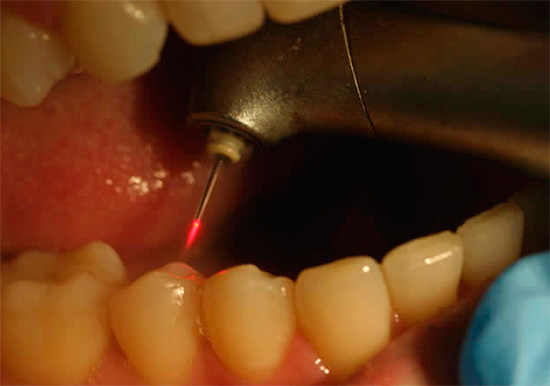
Feedback
“No anesthesia takes me at all. This is a nightmare of some kind. I come to the doctor to simply patch up a hole in the tooth, he cuts off my gum, opens the tooth, and starts shooting at me. I will forgive him to add, he adds, but no result. And it does not matter, on the upper jaw, or on the bottom. I do not know, maybe it is from fear that it is so painful for me to treat caries - I am terribly afraid of dentists since childhood ... ”
Olga Vereshchagina, Tver
When to treat tooth decay really hurts
However, in the treatment of caries, discomfort may occur. If anesthesia is not done, the patient may feel discomfort or pain when cleaning the carious cavity, when areas of dentin close to the pulp are disturbed with boron.
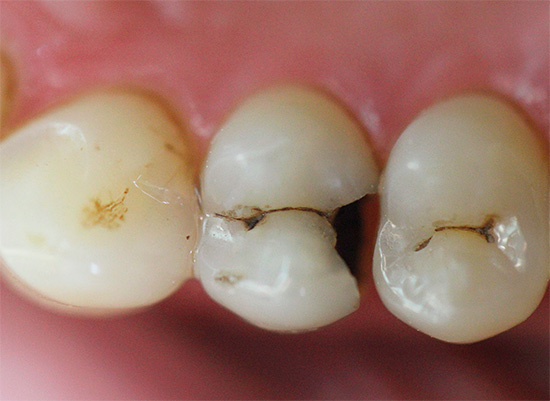
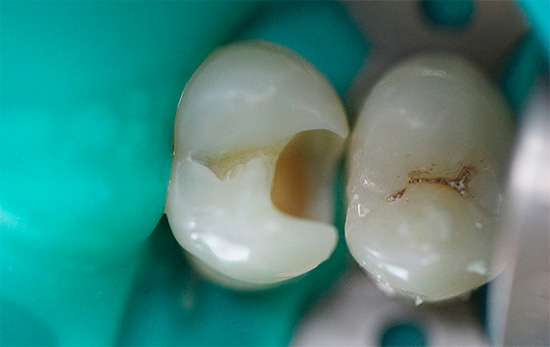
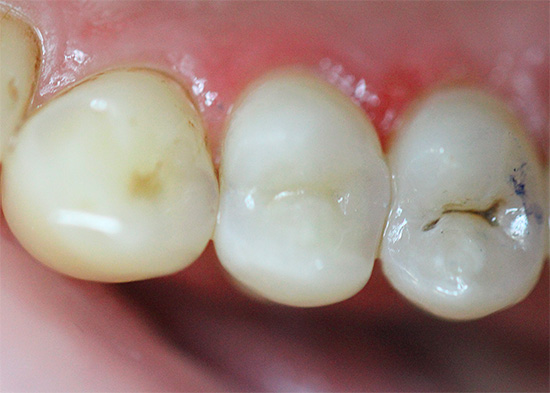
If the walls of the tooth are damaged during the treatment, the doctor will need to place a special matrix. At the same time, he sometimes corrects the gum in the process of its installation, which also causes discomfort, and sometimes even pain and slight bleeding.
If anesthesia is done, the injection itself may seem painful to especially sensitive patients, but compared to the pains that the patient may experience during the treatment of caries, the anesthesia itself causes minor painful sensations.
Occasionally, when the patient is intolerant of painkillers, all operations have to be performed without anesthesia. This is probably the only situation where dental treatment can be very painful. But in these cases it is possible to carry out all the work under anesthesia, when consciousness is disabled.
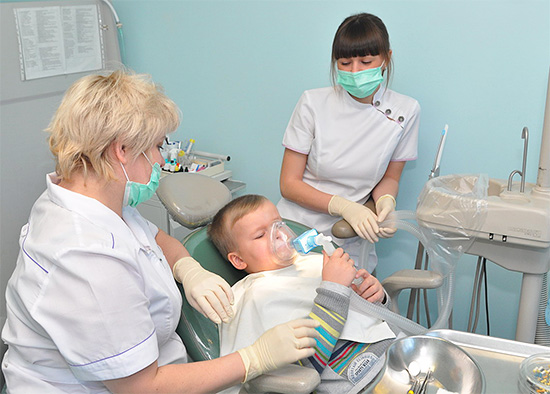
Treatment of caries through the eyes of the patient
In general, being afraid of pain in the dentist’s chair and because of this delaying the visit means increasing the risk of serious damage to the tooth and gum near it and condemning you to complicated medical procedures and large cash costs in the future. At the first occurrence of pain in the tooth, you should immediately consult a doctor - treatment in this case can be practically painless.
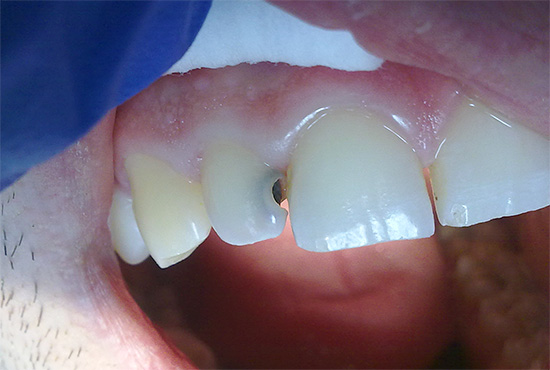
Already in the chair do not hesitate to ask questions to the doctor. He should explain the situation with the tooth to the patient, show the pathology in the mirror or in the picture, describe the course of the upcoming treatment.
Different dentists treat anesthesia differently in the initial stages of caries development, and in some situations, the doctor suggests starting the enamel without an injection. It is worth relying on his professionalism, but agree that if the pain appears or becomes too strong, he will do the anesthesia.
On a note
Often with caries it is very difficult to establish the nature of the internal lesion of the tooth without opening the enamel. In such cases, the doctor needs to begin to treat the carious cavity, and already when the scale of the problem becomes clear, he will decide on pain relief. In addition, if a patient has never undergone local anesthesia before the visit to the clinic, some doctors are afraid to take risks, because in very rare cases painkillers can cause an acute allergic reaction. That is why there is always an anti-shock first-aid kit in the dentist's office to provide an opportunity to save a person even in the event of serious manifestations in the form of anaphylactic shock.However, do not be afraid: the risk of its occurrence is minimal.
After the procedure of treating and cleansing the carious cavity, the doctor proceeds to “harmless” (in terms of the risk of pain) manipulations associated with the preparation and staging of filling materials on the tooth. In most cases, modern anesthetics work flawlessly, and allow you to carry out all stages of treatment, including potentially the most painful - the initial, without pain. Here the professionalism of the dentist himself, the knowledge of basic and additional anesthesia techniques, the possibilities of their combination to achieve the goal are important.
In general, if you trust the doctor, you should not worry from the very beginning: he will do everything possible so that during the treatment you will not be hurt.
Interesting video: treatment of caries without pain
An example of preparation of the carious area with a laser

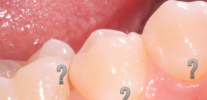
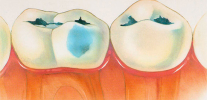
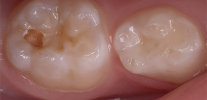
I am 16, there was a hole in the tooth in the lower jaw. Pulling, pulling until the tooth began to ache terribly, especially after sweets. So shot, my God, I do not want such sensations to anyone! I went to put a filling: there was no pain, although the nerve was open, the doctor was very good, although young. It seemed not yet experienced, but still. He cleaned out and sealed my tooth. The seal of the year after 2 flew out, the hole was huge, but I abandoned it because I was afraid. Foolishly, of course, then the cheek swelled terribly, the tooth lifted up — neither could eat nor speak! The pus was in the gum, once passed quickly, rinsed with a solution of soda and water. I went to the dentist, he cleaned the canals, but again became inflamed, just for the holidays.I suffered terribly, for 3 days in a row I was tormented, moaning went, did not sleep. Nothing helped! Then the father freaked out and called a friend and asked to snatch, for a tidy sum, of course. Injection put the most expensive, because cheek with pus was very painful. And then I was pulled out, and I felt everything, I will never forget it. Therefore, do not wait, but go immediately to the hospital, because it is much easier to treat your teeth at the initial stage of the disease. Be healthy!
And what was more painful, filling or removing a tooth? And a tooth with a root pulled out? I already had a tooth removed in the lower jaw, but on the other hand there is a tooth with caries and a nerve already open, and I wonder if the filling or removal is more painful, since I have already removed the tooth removal and I know what it is.
I had three pulpitis, this is when the caries gets to the nerve and hits it. So I faced with a filling. It seems to me that it is harder to pull a tooth out (I, too, have already come across this in my 13). If caries gets to the nerve, then there is no way without local anesthesia, so you will not feel anything. Pull out teeth, sort of like, without anesthesia.In any case, if you feel discomfort, you can ask the dentist to give you anesthesia))
I wonder where it is so pulled teeth without anesthesia? It seems that we do not live in the Stone Age))
Dear Catherine, if you have nerves open, most likely pulpitis. In one visit, under anesthesia, you can cure your tooth absolutely painlessly) Do not be afraid.
I had to remove 1 tooth, and I was removed without a shot, just pulled out.
In theory, if your nerve was open, then you already had to remove the nerve and clean the canal. The infection has already penetrated the canal.
I removed a tooth this week, there was caries in it. I could not understand for a long time why my jaw ached, went to the municipal dentistry - they said nothing. So I guessed it to hellish pain, then my brother took me to "his" clinic, and there it turned out during the orthopantomography. They said that if he had come earlier, the tooth could have been saved.
Tomorrow I'm going to fill a tooth, the pain is hellish! I'm afraid terribly. All would give for a healthy tooth. I hope it will not hurt.
In principle, it is not always painful, but sometimes they will put an injection and the whole mouth becomes numb, except for the tooth itself ...
I have already been treated with the front tooth. If I cleaned the channels, will I still clean them?
Yes, they will clean again ...
I am 12 years old. I just will not forget when I went to the dentist twice. Generally. The story about the first tooth was not a pleasant one. When I ate something, I began to feel pain in the upper right gum. At first I did not pay attention to it. Then everything got much worse! I couldn’t even chew an ordinary savory meal. She told everything to her mom. She told me to go to the dentist. Then I became so hysterical that I simply could not see. Still, we went. I was told that the hole is quite large and all the dirt is already in the canals and they need to be cleaned. Mom comforted me. She said, they say, not painful and not scary! Though I calmed down, I still ached. And yet, inside me, someone said that everything would be fine. It was such a real untruth! I don't want to scare anyone, but it was horrible. I went there for three terrible days. The pain is unbearable, I will not wish the enemy. Once, even after it all passed, I had a nightmare. How much blood and tears.Can't imagine.
But that is not all. My third channel simply stupidly could not find! And they shoved me with some kind of needle in the tooth and made me walk with it all the time. Or whatever ... Where a photo of the root of a tooth is made. And so every fucking time. And then, due to a long non-emergence, another doctor came and stuck another needle into my gum! This hellish pain! It just does not pass. I screamed at the whole hospital and scared all the kids. I do not wish this to anyone, honestly. When, finally, it was all over, they told me that I needed to cure another tooth. ONE MORE! I ached again. Yes, I ached so much that it is not easy to convey. I persuaded my mother not to go there the next day and, surprisingly, she agreed. All this was delayed until May. And my mother remembered the tooth, which must be cured. Well, we went. And they told me that it was too late. Need to rip out. And I was scared, but in vain. Ripping out is even lost (like losing a tooth forever), but it doesn't hurt so much. At first I cried. I thought it would be even more painful, but no. I was called into the office and put on a chair. The doctor got a sooo long syringe. Why I became even more afraid. Then she pulled something into this syringe and gave me three shots in the gum.People, it doesn't hurt a bit! Do not be afraid of these injections. Then I calmed down and thought to myself: “Seriously, but this is not more painful than a mosquito bite!”. After my jaw, the upper began to take what was in the injection. After five or three minutes, my jaw became like a wooden one and my mother and I laughed at this. And I very much calmed down. Then I began to choose a tooth. Three roots. It really doesn't hurt at all!
But ... Before I left the hospital, I noticed that caries had started at the bottom of the canine and did not tell my mother. Now is July 6th. And I still haven't told her since that moment. I am very afraid of the first sensations when I cleaned the channels. The tooth itself has not broken yet, as at that time. And I think it will not hurt so much. But still I'm afraid to tell my mother. And I understand perfectly well that it will only get worse if I do not tell. But fear is stronger.
In general, guys. No one would wish such pain. But still, I always know that dentists want to help us. And I'll go whining again, that soon everything will happen again.
3 teeth hurt me, I die from pain. It's terrible, so I want to say, treat your teeth in the early stages
I also became interested in this question, today I was drilled 1 tooth, sprayed with some kind of spray, because I didn’t want to give an injection.And something did not really help, it was painful, so I do not advise you to use all sorts of sprays. Tomorrow they will drill again, this time I will ask for an injection. I know that the injection of pain relieves more, because once I pulled out a milk tooth with a injection and there were almost no sensations. Eh, but a little scary.
I am very afraid to go to treat a tooth. The hole is kind of small, but chewing with this tooth is painful. Anesthesia does not always help.
Hello! In modern dentistry, there are already significantly fewer cases when dental treatment is accompanied by pain. Today it is difficult to run into dentists who treat teeth without anesthesia, even when a person is in pain, or they are not able to make anesthesia of high quality. The doctor is not interested in torturing the patient in order to achieve the desired result of treatment. It makes no sense that the patient will interfere with the doctor to do a quality job.
That is why I advise you to find the dentist who, in the opinion of your relatives, friends and acquaintances, will be suitable in all respects. I wish you to quickly deal with the problem, otherwise the tooth in the future will become a source of infection, or just an object for removal.
If I get anesthesia, will the treatment of the early stage of caries be completely painless?
Hello! If the dentist doesn’t have perfect anesthesia techniques, in particular, infiltration and conduction, then the treatment of even the early stages of caries can be painful. However, most often doctors still have a good command of anesthesia techniques, so I advise you not to be afraid and trust a professional.
I had a temporary filling, today I went to the doctor for treatment, they gave me anesthesia. My tongue and cheek went numb, and I felt a tooth — it was such a pain when a needle was being climbed there, I was hesitating. And why the pain, if the injection set? I had no strength to continue to heal, and I was again given arsenic until the next time.
Hello! I am almost 100% sure that your doctor for some reason was not able to carry out high-quality anesthesia: errors in the technique, no experience in working with different types of anesthesia (conduction, infiltration, etc.). If you do not want to continue to suffer, it is better to change the dentist, since the option of a routine use described by you is not a modern approach to the treatment of pulpitis.And “arsenic” is not quoted at all today, since arsenic paste is harmful to the periodontal tooth.
To summarize: your suffering during treatment is directly related to the violation of the anesthesia technique and the inability of the doctor to apply alternative anesthesia (intraligamentary, intrapulparial, for example, etc.).
I have a very neglected case, I'm afraid to go to the dentist. You can say the floor of the tooth is in black, respectively, the nerves are all open. The tooth does not hurt, but if you press on the caries itself, it becomes painful.
If you put anesthesia, it will be very painful?
Hello! I do not want to scare you, but I will not give false information. It will be as truthful as possible: today, almost all dentists know how to do high-quality anesthesia, few can do it, and there are doctors who play their emotions on patients. Bad doctors are much less than good. In private medicine, it is much less likely that the treatment of the canals of the tooth will even be at least a little painful.
The dentist can even make anesthesia itself invisible with the help of superficial anesthesia even before the “main” anesthesia is done.Find a good dentist today is not so difficult. Enough to learn from their friends of their favorite doctors. Believe me, among your relatives and friends there are a lot more of those who trust a doctor and have much less fear than it was 20-30 years ago. At the reception of a professional dentist, even those who previously feared anesthesia and pain during injections at the end of the procedure are pleasantly surprised that everything went so well. Previously, it was different: either they didn’t do anesthesia at all and were forced to endure, or they used Novocaine, which was like a dead poultice.
It is much more correct and safer to use the services of a good dentist-therapist right now, rather than delay it until the tooth is removed from the dentist-surgeon. The choice is yours!
My seal has fallen. And there is an open nerve. On the half of the crown caries and on the nerve something black. If I treat a tooth with anesthesia, will it hurt?
Hello! Before the treatment of pulpitis, the dentist always performs anesthesia. This is considered a mandatory step in adequate treatment associated with the removal of the “nerve”.However, in rare cases, a doctor cannot provide high-quality anesthesia - there are not so many such doctors, most often this happens in budget organizations with a large flow of patients, terrible provision of medicines and equipment, and the same attitude of the attending physician to their patients. Now these hospitals are becoming less and less, so the likelihood that you will encounter such a doctor is minimal. Wish you luck! The main thing - do not interfere with the doctor to do his job, but with certain doubts your right to interrupt the "torment" and just get up and leave.
Hello, my front tooth broke off by half. Well, the doctors intimidated me, they said, like you have a disease there. I do not remember how they spoke there. They came to remove the tooth, and the doctor said: you have nothing there, only the root is bad, so it is better to remove the tooth. Well, they agreed, they removed this tooth.
But behind me I had 2 more bad teeth, we also deleted them. One tooth was removed two weeks ago and the other yesterday. So, the one that was removed two weeks ago, I already had it cut through (although it was permanent with me).
Now you need to treat a few more teeth.I am terribly afraid, although, in my opinion, I wouldn’t remove the tooth of pain, because I didn’t remove the tooth, but just picked it out, because there wasn’t anything to grab. Although done with painkillers. Now, on the place where my tooth was removed yesterday, my gums are terribly sore.
My questions:
How much will he still hurt me (I mean the tooth that was removed yesterday)?
Will it hurt when a tooth is treated? I do not know if the pain reliever will help me because Yesterday I was terribly hurt - maybe it didn’t work for me yesterday?
And one more. Can I grow that front tooth, because one has already been cut, and the front one does not even think about cutting through? Well, as they say: hope dies last. We hope to grow again, we will wait another month and a half. And that broke away - maybe it will erupt.
Hello! Since you did not indicate your age, I can only guess: was the tooth exactly permanent? It is possible that you are from 12 to 14 years old, when there is still a chance of having milk teeth. If the age is really young, then even more professionalism is required from the dentist - first of all I speak about the anesthesia technique.To make anesthesia of high quality, you need not only the patient's help (adequacy, calm, etc.), but also the skills of the doctor, as well as a high-quality effective anesthetic (which is not the case in all clinics).
Now I answer the questions more specifically:
1. After tooth extraction, the hole hurts on average 1-3 days. Again, this is not about acute pains (they pass on the first day of removal), but about aching, or from irritants. From irritants (when you press the gum), they can hold up to 5-7 days. This is quite normal and well tolerated.
2. It will not hurt to treat a tooth if the doctor is well prepared. However, if on the eve of the doctor did not cope with the task of anesthesia, then the risk is high that it will happen again.
3. About the last question: again, I doubt how old you are. Is there any chance of having temporary teeth at all? If new teeth continue to erupt, you can check with a panoramic picture whether there are no impacted teeth. Then it will be possible to find out whether the eruption of new teeth is planned.
Hello! I have two teeth with a small blackness, here is a straight line of blackness. But the teeth do not hurt. Tomorrow I'll go to the doctor.Will it hurt me to treat them?
Hello! Most likely it won't hurt. Now dentists have a lot of good anesthetics to relieve tooth quality. In addition, sometimes this “black strip” on a tooth indicates a tartar (that is, it is not always caries). So here it is necessary to look, whether it is necessary, generally, anesthesia, or not.
I have 2 caries, will it hurt to clean it?
Hello! Dentists today have an arsenal of imported anesthetics that work effectively on almost all patients. Secondly, with proper skills in working with anesthesia, a dentist can make any dental procedure painless, ranging from caries treatment to the removal of complex wisdom teeth.
At the same time, an inexperienced (or negligent) doctor even with imported “freezing” treatment is often painful, and the patient’s negative emotions in some cases will even be good for him: so that he doesn’t come and load his routine work (this applies to budget institutions).This phenomenon is - to deny meaningless, but good dentists, which is beneficial for you to get only positive emotions for your money, much more. So the chance of painlessly cured tooth decay (or other dental diseases) is much higher than vice versa. It remains to advise you to find out through relatives, acquaintances, friends, colleagues, where a good specialist works, and boldly go to him without fear that something will go wrong.
If the doctor is a young woman, careful and kind, it does not hurt.
7 does not hurt from above, does not react at all to food (cold-hot), but there is a hole in the tooth on the side. I do not remember whether they were treating him or not, I'm afraid to heal. What is the probability that there are no more nerves? Will it hurt to heal?
Hello! About probability is a difficult question. The fact is that I do not know the scale of the tragedy, that is, how big this very “hole” that you describe is there. Even with significant defects in some cases, the tooth reaction may not be due to the deposition of substitution dentin.Of course, most often this reaction (to cold, hot, sweet, etc.) is still there.
It is best to trust the doctor: let him assess the condition of the tooth visually or by taking a diagnostic picture, check whether the tooth is treated in the canals and how well this treatment has been performed. If it turns out that the tooth is not treated in the canals, the doctor himself will decide whether to depulpate it or to treat it according to the diagnosis “Caries”.
As for the pain in the treatment: if the tooth is depulped and treated with high quality, then it will not hurt to treat (due to the fact that the tooth is dead, even anesthesia is not done). If the tooth is alive, it is usually treated with anesthesia, especially since it concerns depulpation. When the doctor is a professional, the treatment is painless. By the way, 7 upper teeth are one of the most responsive to “freezing”, even a doctor with average skills will cope if only there is a desire.
As for the canal treatment, if they have already been treated before, but it turned out not very (or there is an inflammatory process on the roots), then more often this is done with anesthesia on the same principle as I described above. Look for a good doctor and do not be afraid!
Hello, I am 13 years old.Tomorrow I'll go to treat a tooth. He has blackened filling, I am very afraid to treat him. I encourage myself, agreed to an injection. It would hurt me? I treated my teeth in a free clinic and there I was badly given an injection and it was not much, but it hurt.
Hello! Paid clinic is provided with all necessary and most often copes with the task: qualitatively and not painfully. In principle, it depends on this, whether you want to come again (and give your money) or not. Therefore, you can safely trust a professional and speak at the slightest discomfort about your problems so that the doctor responds promptly to this. If the tooth is upper or from the first to the fifth lower, then closer to 90%, the treatment procedure will be absolutely painless. The lower 6, 7 and 8 teeth “freeze” is somewhat more difficult, but, again, with the skill of a doctor and a high level of training, everything will also go away with a bang. Heal as soon as possible and stay healthy!
Hello. Cured caries without canal treatment. Put a seal + anesthesia, took 3000 rubles. Is it expensive or not for the treatment of average caries? What is the sum of this sum?
Hello! It depends on what region we are talking about. The average check for metropolitan areas is from 2-3 to 4-5 thousand rubles for average caries, depending on the “bells and whistles” of the dental clinic. In the provinces, you can meet up to 2 thousand rubles, but not less than 1 thousand rubles - this is for sure, since the purchasing part of the materials is now a fairly large item of expenditure.
As for the components of this amount:
1. The price of anesthesia - from 150 to 500 rubles (depending on the selected drug);
2. The quality of the seal (chemical - on average about 300-800 rubles, light seal - 500-3000 rubles);
3. Gasket material (some clinics consider it separately. Depending on the material - 100-500 rubles).
In the price list there can also be a category associated with the localization of the carious cavity, since the complexity of the work depends on it. For example, comfortable cavities with 4 walls on the chewing surface can be rated together with the material used. It can be written: "Treatment of average caries, Filtek - Z250 Class I according to Bleck - 1800 without anesthesia." If we are talking about breaking off the side wall with the same average caries, the price will be more expensive, since the doctor uses special matrices to restore a good gap between the teeth.The treatment of the front teeth due to the requirements of aesthetics (restoration of beautiful shape and color) can be much more expensive, although the price may simply reflect: “Restoration of the front tooth with an average caries Filtec-Z250 - 2500 rubles without anesthesia” or “Restoration of the front tooth with an average caries with violation of the integrity of the angle of the coronal part of the tooth Filtec-Z250 - 3000 rubles without anesthesia. "
That is, here the “flight of thought” at clinics is so individual that it can sometimes be abused, although a savvy patient, knowing the features of pricing, can roughly understand when 3000 rubles for average caries is expensive, and when it is an average check in the city.
Finally, I can’t say that a number of dentists have additional price points for any caries: use of laser, ultrasound, cofferdam, saliva ejection, applying “varnish-glaze” after treatment, artistic restoration of the tooth (modeling pits, tubercles, corners of the crowns according to the bite and etc.) In addition, with the same average caries, not one surface is affected on one tooth, but 2 and more - for example, on chewing and around the gum (cervical), that is, there will be two fillings, the work is more complicated and the price is significantly higher .
Thank you very much for the comprehensive answer! Today I made the 2nd tooth, the cost of treatment is the same - apparently, this is the cost of treating the average caries. I would like to note the high professionalism of the dentist. And to say that in our time it is not painful to treat the teeth with anesthesia, moreover, there is not even the slightest hint of pain. People, do not be afraid to treat caries, any manipulations with anesthesia are absolutely painless!
I treated deep caries without anesthesia, and it didn't hurt, but everything was tolerable. Drill a minute, maximum - two!
Hello! I have a problem, after birth, teeth began to crumble, and the cervical caries of the upper teeth. I am very afraid if it will be painful to heal.
I have black dots and stripes on the teeth. Can you tell if it will hurt? I am told that it is caries and that the pain will be unbearable.
Hello, Alexander. You have been misinformed. In modern dentistry, dental treatment is carried out under local anesthesia, and in most cases, patients do not feel pain at all when dissecting a drill.
As for the black dots and stripes on the teeth - it’s not a fact that it is caries.I recommend you to start with professional oral hygiene and diagnostics.
Pigmentation may be associated, for example, with the presence of dental plaque.